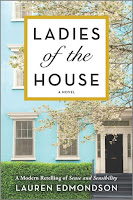Favorite Quote: "Survival is woven into the fabric of who I am. I never asked, 'Why did this happen to me?' bur rather, 'How can I overcome this situation?' It is easy to let past trauma or injustice rule your life forever, but I want to be free, so I needed to understand and forgive others ... above all, I keep in mind that my happiness is up to me now ... I am very proud of my ancestors, my home country, and my past. I have just learned to leave out the parts that don't serve me as a woman, a mother, a human."
***** BLOG TOUR *****
Review
The memoir begins by stating why it is written. "Stories have always created understanding and connection between humans. In this era of great misunderstanding, I wish to help rein us back in to our shared humanity. The beauty of my culture was imprinted on me when I was very young, and I cherish it so deeply that my desire to share it only grows. Like an archeologist desperately excavating a forgotten world, Want to bring the details of my nomadic upbringing to life before it is lost forever."
It then goes on to provide a snapshot. "The resilience I learned from surviving life in the desert carried me through the unexpected death of my young mother, being chased from my country by civil war, and defying my clan's expectations after I dared to fall in love with a man from the 'wrong' country."
The first person narrative then delves into the details of those stories and that journey that begins in the desert of Somalia and, today, continues in the hills of California. In between is death, abuse, genetic mutilation, near rape, an orphanage, a civil war, and a new country. However, in between also is family, faith, friendship, courage, resilience, and love.
The only hesitation I have about this book is the distance I sometimes feel. Perhaps that is the distance of an adult reflecting on her past. Perhaps it is the distance needed to not drown in the emotions this journey entailed. Perhaps, it is none of these and simply is a writing approach. This book tells of a heart wrenching reality. More often than not, it "tells" the story rather and making me feel as if I am "living" it. Not that I would wish to live some of these experiences. Yet, in a book, it is this difference that completely transports me into the world of the book. This transition happens at brief, emotional moments in the book, but then it reverts to telling the story.
Other than that, this memoir both moves and educates. I have friends who are from Somalia, but some of the experiences described in this book are not ones we would ever discuss. By her willingness to share her story, the author provides an insight into the culture and traditions of Somalia and provides me with a better understanding of my friends. For that, I am grateful.
The author brings to life her nomadic life in the dessert and pays tribute to her grandmother who sounds life a fierce, amazing woman. Interestingly, the young Salh is wrenched away from that nomadic life and brought to city life. Yet, for so much of her life, she remains a nomad due to circumstances - family choices, civil war, and life as a refugee.
The fact that she eventually finds a home in the United States makes this a particularly timely story. By describing the cause, the journey, the fact that no one becomes a refugee by choice, and the willingness to work for an adoptive home, the book speaks to the plight of people around the world forced into similar situations. Perhaps, the book may educate on that broader scale as well and promoting understanding.
About the Author
Shugri Said Salh was born in the desert of Somalia in 1974 and spent her early years living as a nomad. In 1992, she emigrated to North America after the civil war broke out in her home country. She attended nursing school at Pacific Union College and graduated with honors. And although this is her first book, Shugri has been storytelling since she could talk. From her grandmother and the nomadic community in which she was raised, she heard stories and learned of their power to entertain, teach, and transform. She lives in Sonoma County with her family.
About the Book
Born in Somalia, a spare daughter in a large family, Shugri Said Salh was sent at age six to live with her nomadic grandmother in the desert. The last of her family to learn this once-common way of life, Salh found herself chasing warthogs, climbing termite hills, herding goats, and moving constantly in search of water and grazing lands with her nomadic family. For Salh, though the desert was a harsh place threatened by drought, predators, and enemy clans, it also held beauty, innovation, centuries of tradition, and a way for a young Sufi girl to learn courage and independence from a fearless group of relatives. Salh grew to love the freedom of roaming with her animals and the powerful feeling of community found in nomadic rituals and the oral storytelling of her ancestors.
As she came of age, though, both she and her beloved Somalia were forced to confront change, violence, and instability. Salh writes with engaging frankness and a fierce feminism of trying to break free of the patriarchal beliefs of her culture, of her forced female genital mutilation, of the loss of her mother, and of her growing need for independence. Taken from the desert by her strict father and then displaced along with millions of others by the Somali Civil War, Salh fled first to a refugee camp on the Kenyan border and ultimately to North America to learn yet another way of life.
Readers will fall in love with Salh on the page as she tells her inspiring story about leaving Africa, learning English, finding love, and embracing a new horizon for herself and her family. Honest and tender, The Last Nomad is a riveting coming-of-age story of resilience, survival, and the shifting definitions of home.
Press Release
“I am the last nomad. My ancestors traveled the East African desert in search of grazing land for their livestock, and the most precious resource of all—water. When they exhausted the land and the clouds disappeared from the horizon, their accumulated ancestral knowledge told them where to move next to find greener pastures. I am the last person in my direct line to have once lived like that.” These lines open Shugri Said Salh’s captivating and utterly original debut memoir, THE LAST NOMAD: Coming of Age in the Somali Desert (Publication Date: August 3rd, 2021; $26.95.) Chronicling Salh’s remarkable journey from her idyllic childhood with a nomadic grandmother in Somalia to her escape from her country’s brutal civil war to her unfamiliar new homes in Canada and then California, THE LAST NOMAD is an unforgettable story of hope, survival, and the shifting definitions of home.
Born in Somalia in 1974 as the fourth daughter in a society that saw daughters as a burden, Salh was sent to live with her beloved ayeeyo (grandmother) at the age of six to learn a once-common way of life. She left behind her parents, her father’s multiple wives, her many siblings, and her home in the city of Galkayo. Though the desert was a dangerous place threatened by drought and hunger and plagued by predators, she grew up courageous and free, learning how to herd camels, raise her own goats, and become a part of the community found through the courtship rituals, nightly stories, and cooking songs of her ancestors. She was even proud to face the rite of passage - a brutal female circumcision - that all “respectable” girls undergo in Somalia.
After the death of her mother and the violent political turmoil that took over the country, Salh was wrenched from the nomadic life she loved. Living first in a refugee camp on the Kenyan border, and ultimately moving to North America, she became a different kind of nomad who was thrust into a new way of life – a life that required navigating everything from escalators to cold weather to marriage and parenthood. With engaging wit, a fierce feminism, and vivid writing that transports readers instantly, THE LAST NOMAD portrays a rich portrait of one woman’s indomitable spirit, and the many vastly different worlds she has encountered in one lifetime.
“There is a saying in my culture that loosely translates: death is inevitable, so make sure your words prevail,” Salh explains. “I realized that if I didn't write this story of mine, it would die with me. It is not only my story, but the story of my family, nomadic culture, my country, and what it is like to be a Somali woman. It is important for me to record my unique upbringing, so my children and their descendants know the strong women they come from. I hope my story ultimately inspires those who have faced adversity in their lives, and brings us all together as humans, regardless of our backgrounds, religion, nationality and gender.” Salh now lives in Sonoma County, California with her husband and three children, and works as an infusion nurse.



